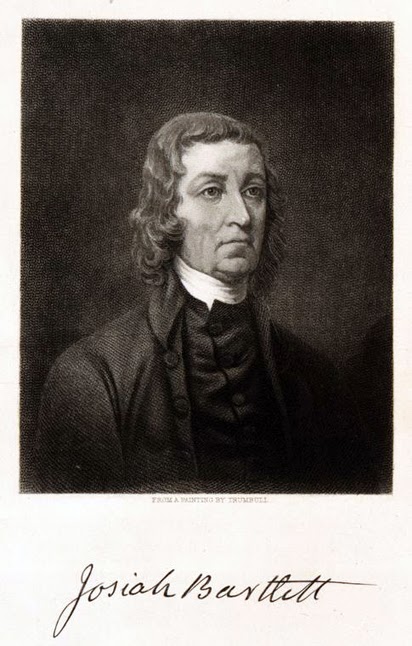Josiah Bartlett was born in Amesbury, Massachusetts in 1729. He was the fourth son of Stephen Bartlett. His mother’s maiden name was Webster. Daniel Webster was a cousin. His ancestors came from England during the seventeenth century.
Young Bartlett did not have the opportunity to study at a college. His uncle, Dr. Webster, taught him Greek and Latin.
Josiah Bartlett, Physician
At the age of sixteen, he studied medicine from Dr. Ordway for five years. After his studies, he began practicing medicine in Kingston in 1760.
Dr. Bartlett became a distinguished practitioner. In 1754, Kingston suffered an outbreak of diphtheria. At the time, this was a fatal disease. One of Dr. Bartlett’s children contracted the disease. He treated his child with Peruvian bark. His child recovered completely and Peruvian bark became a successful treatment for the disease.
Josiah Bartlett, Politician
In 1765, the province of New Hampshire elected Doctor Bartlett to the legislature. As a legislator, Dr. Bartlett believed in a representative form of government fervently. This soon put him at odds with the royal governor, John Wentworth.
When opposition to British rule grew hot, Governor Wentworth appointed Dr. Bartlett as Justice of the Peace. He also gave Dr. Bartlett a commission in the militia. The governor hoped to win Dr. Bartlett’s loyalty. Dr. Bartlett accepted the appointment, but his opposition to the governor never wavered.
When the state assembly appointed a Committee of Correspondence in 1774, Governor Wentworth dissolved the assembly. The legislators met anyway at another location. The purpose of the committee was to convince towns to send delegates to Exeter. This convention would select deputies to the Continental Congress that would meet in Philadelphia in September 1775.
In the meantime, relations with the House of Representatives and Governor Wentworth declined. The active role that Dr. Bartlett played in advocating for a representative government earned the wrath of Governor Wentworth. Wentworth fired Dr. Bartlett as Justice of the Peace and militia commander.
Governor Wentworth’s personal safety could not be assured. He retreated to Boston and terminated the royal government of New Hampshire.
Dr. Josiah Bartlett, Patriot
In September 1775, Dr. Bartlett took his seat at the Continental Congress in Philadelphia. In 1776, the Continental Congress took up the question of the Declaration of Independence. Dr. Bartlett was the first member to give his vote for independence. When the Continental Congress reconvened in August 1776, Dr. Bartlett was the first delegate to sign the Declaration of Independence.
After the British ravaged Philadelphia, Dr. Bartlett wrote about conditions in Philadelphia on their return:
“Congress was obliged to hold its sessions in the college hall, the statehouse having been left by the enemy in a condition which could scarcely be described. Many of the finest houses were converted into stables; parlous floors cut through, and the dung shoveled through into the cellars. Through the country north of the city, the hand of desolation had marked its way for many miles. Houses had been consumed, fences carried off, gardens and orchards destroyed. Even the great roads were scarce to be discovered amidst the confusion and desolation which prevailed.”
Dr. Bartlett served as an Associate Justice of the Supreme Court in 1782. In 1788, he was a delegate of the convention in New Hampshire that ratified the Constitution of the United States.
In May 1795, Dr. Josiah Bartlett died at the age of 66.
Source: Rev. Charles A. Goodrich Lives of the Signers to the Declaration of Independence. New York: William Reed & Co., 1856. Pages 131-138.
